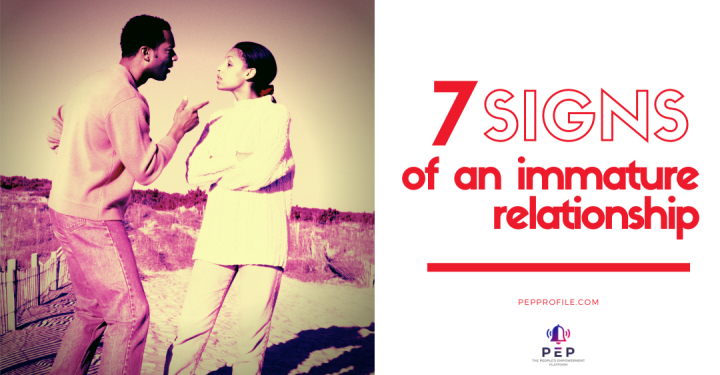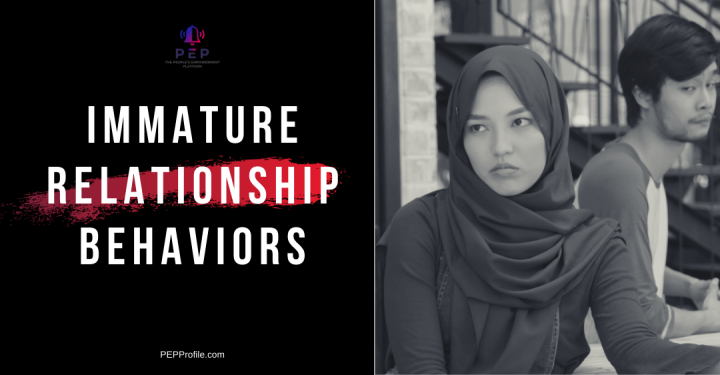Member Sign In
Login with email and password
No account yet? Register Now
I want to walk you through the seven signs that you may be in an immature relationship and how to know whether you’ve outgrown it.
Now, I’m sure many of us look back on relationships when we were in high school — maybe college — reflect on the way we behaved and quickly chalk it up to a learning experience. From these early relationships, we gain a better sense of who we are, what we need and new skills in healthy communication that we can take forward into our relationships as adults.
But what happens when someone doesn’t learn these skills or gets stuck in old patterns of unhelpful behavior?
The answer is that they may be stalling the maturation of a relationship, such that one partner is ready to make commitments and work together, while the other is still in the relationship paddling pool.

Think this might be you? Here are seven signs that you may be in a stagnating relationship and that perhaps you have outgrown your partner.
The first sign that you might be in an immature relationship is if your partner struggles to talk about their feelings. Emotions serve as critical information we can use to make decisions and set boundaries. This is something scholars refer to as emotional fluency, and being emotionally fluent has been linked to success in long-term relationships.
There are many reasons why your partner may lack emotional fluency. Ron Huxley, family therapist and author of the book Love and Limits, explains that if we lacked emotionally fluent role models growing up, such as if we never saw our parents productively and respectfully communicate their feelings, our own emotions as adults may reveal themselves in the form of dysfunctional behaviors instead of words.
Another possibility is that the immature partner struggles with vulnerability and is guarded in the expression of their feelings. The result is that they may always ‘play it cool’ and act unhurt in the face of that ignored text or forgotten special occasion, which sex and relationship expert Dr. Esther Perel tells us can “... deprive a relationship of true closeness and connection.”
So, if you find that while you are readily able to express how you feel, but your partner broaches the subject of emotions with a shrug, seems closed off or is too busy throwing a tantrum to put their feelings into words, chances are, you may have outgrown that relationship.
But also, HOW you communicate your feelings plays a role. Sarcasm, talking down, pointing the finger, being defensive or expecting someone to get it just because your on an emotional rant is not emotionally fluency.
I once asked a therapist out on a date and one of the best things she taught me was to always start with is how you feel.
For instance, rather than saying, “you shouldn’t do this, or you shouldn’t do that.” It would be more productive to say, I feel - dot. dot. dot.

The second sign that you may be in an immature relationship is if your partner pulls away in times of stress. As the lives of you and your partner become more intertwined, you will grow increasingly aware of the sources of stress in each other’s lives. This could include stressors they face at work, tasks around the home or responsibilities they may have caring for others.
The immature versus mature partner will respond differently when they sense that we are becoming overwhelmed. The immature partner will see our stress as a threat to their own energy and personal resources.
This may lead them to pull away, such as by avoiding you or dismissing your feelings or requests for support as being too much to deal with. According to John Coleman, coauthor of the book Passion & Purpose, this is symptomatic of thinking of the relationship in terms of the “I” — or asking: What can I gain from this relationship?
The mature partner, on the other hand, will recognize the opportunity they have to show up for their partner in times of stress by providing comfort, listening and helping with responsibilities.
The mature partner, therefore, moves toward the idea of managing stress together, which stands to develop greater closeness, trust and coping capability.
So, if you find yourself feeling alone in times of stress, and your partner is either nowhere to be found or makes you feel guilty for feeling stressed, they may not be mature enough to think about the relationship in terms of the “we” rather than the “I”.
I was actually with a woman who made everyone around her the enemy in times of stress. Very tough thing to deal with.
Number three is rampant jealousy. We all know what it feels like to get a little jealous in our relationships, and to an extent, it’s reasonable to want to guard over the people we love. However, when a partner begins to spy over our text messages or get irritated when we spend time with friends, this may be a sign of immaturity.
Psychologists agree that there can be a range of contributing factors to jealousy in relationships. Sometimes jealousy can be a sign of distrust, which may stem from having witnessed infidelity between one’s own parents. This can flow on to fundamentally affect how we conduct our relationships as adults.
Consider this: one study in the Journal of Couple and Relationship Therapy found that if your father committed infidelity, odds are that your romantic relationships will be characterized by significantly lower levels of trust, justice and loyalty than if your father hadn’t committed infidelity.
Okay! Welp. Trust issues explained.
Another contributing factor to jealousy in the immature partner can be co-dependence, which is when one partner displays an excessive emotional or psychological reliance on the other.
In this situation, the codependent partner may grow jealous seeing their primary source of support giving attention to others in their life.
Alternatively, one study of 250 married couples in the Journal of Social and Personal Relationships found that experiencing jealousy can stem from problems with low self-esteem. This suggests that to have a mature relationship, both partners must show up to the party with a healthy sense of confidence and self-worth.
Jealous reactions should evolve to become healthy conversations about boundaries and what two people feel to be the line between acceptable and unacceptable behavior. If your partner reacts badly to this kind of communication, it’s a sign there may be something deeper underlying their jealous reactions that perhaps they’re not yet mature enough to unpack.
I met a woman whom I thought I was going to marry and have kids with. But being a recognizable actor constantly being doted on by female fans made her livid. As I got to understand the trauma of her past, I began to see how all of the above as well as being violated by the people you trust played right into the dynamics of our relationship.
Number four is if your partner behaves spitefully. When the immature partner feels hurt, rather than calmly discussing how your behavior made them feel, they may choose to retaliate with the intention of hurting you as much as you hurt them.
For example, if you got tied up at work and didn’t respond to their message for several hours, their response might be to ignore you for twice as long the next day.
This kind of behavior is not characteristic of a mature relationship. In fact, it may be a sign that your partner craves power and control more than they crave a loving connection. Given that spiteful behavior has been linked with the darker side of human personality, such as narcissism and machiavellianism, keep on your guard if this kind of resentful behavior begins rearing its head.
In contrast, mature relationships are characterized by a trust that both partners are doing their best to behave in a way that takes the other person’s feelings into account. Failing this, a respectful conversation should be on the table. If this is where you’re at, but your partner is still out in search of revenge, they may be lacking the maturity you’re after and possibly harboring something darker.
The fifth sign that you may be in an immature relationship is if you haven’t talked about the future. Sustainable relationships require both partners to invest emotionally in a possible long-term future together.

Samantha Burns, couple’s counselor and author of Done with Dating: 7 Steps to Finding Your Person, says that “An emotionally immature partner likely does not think ahead and plan a future with you, but rather lives in the moment... If [they] do see a future together, [they] probably have a lot of difficulty articulating and communicating this vision.” All of this may be a sign that you’re dealing with a partner who has commitment issues.
When diagnosing commitment issues in a relationship, psychologists often refer to a framework known as Attachment Theory. Attachment Theory argues that whether and how we bonded to our primary caregivers in early childhood affects our confidence and behaviors in our relationships as adults.
Those who experienced secure attachments from an early age will be more capable of trust and therefore more willing to discuss plans for the future with you. However, early childhood experiences, such as abuse, the death or walking out of a parent, or a nomadic lifestyle that denied the opportunity to form long-term bonds, may result in a person having an insecure attachment style.
Depending on the nature of the dysfunctional attachment style, this may result in avoidance or emotional discomfort with the idea of commitment.
If you find yourself wanting to discuss shared plans for the future, but your partner is unwilling to commit to anything further than a weekend away, chances are, your partner might be suffering with an insecure attachment style that is stalling the maturity of the relationship.
Number six is if your partner doesn’t like to be held accountable. We all mess up in our relationships — we will inadvertently hurt our partners. Being willing to admit when you make a mistake and apologize is a key sign of not only maturity in relationships but maturity in general.
An unwillingness to be accountable for our actions and apologize can be indicative of a wish to maintain control or dominate in our relationships. By taking the moral high ground in all situations and refusing to take responsibility for errors, the immature partner protects him or herself from the floodgate of accusation that they fear should they confess to even just one mistake.
In these situations, the immature partner sees the protection of their ego and worldview as more important than finding mutual ground, which we know does very little to strengthen a relationship and is almost certainly likely to weaken it.
If you find that you always seem to be the one apologizing and that somehow your partner manages to slip under the radar when they mess up, you may be dealing with someone who is not mature enough to own up to their errors and let their ego take a back seat.
Finally, number seven is that your conflicts are unproductive. When emotions run hot, there’s a temptation to bring a win-lose mentality to the disagreements that crop up in our relationships.
However, those in successful, long-term relationships will know that, more often than not, arguments stem from miscommunications and differences in point of view and are rarely an intention to hurt the other person.
As with our approach to attachments, our approach to handling conflict is often dictated by what we witness in our early years between our parents and close family. These people will serve as role models that establish our later patterns of productive or unproductive conflict resolution.
Likewise, we know from research that whether the climate within our families growing up encouraged uniformity of opinions or open, respectful expression of disagreements, will feed into our mentalities and conflict styles as adults.
Having lacked productive role models for conflict in his or her earlier years, the immature partner may be more prone to letting a discussion devolve into yelling or arguing, thus missing out on the opportunity to better understand your point of view.
If you find yourself looking back on your arguments and wondering why they couldn’t have been resolved with a simple conversation, it’s a sign you may have outgrown your partner and their approach to conflict resolution.

We all start somewhere when it comes to relationships, but at some point, you want to know that your partner is matching your pace. If these seven signs have left you thinking you may be stuck in an immature relationship, here are three tips to break out of the rut.
First, work on communicating your expectations, emotions and desires. With one study in the Journal of Sex & Marital Therapy finding that poor communication was the second most cited reason for divorce (after a lack of love or intimacy), clearly, this is one area where we can all stand to improve.
Yet, often we act as though our partners can read our minds!
Instead, try setting an example for your partner by modeling the kind of communication you’d like from them. Try ensuring that you are fully present and practicing active listening when they are speaking.
Also be sure to celebrate and acknowledge when things go right in your communication. This could include expressing appreciation for your partner’s helpful actions, conveying your pride in their accomplishments and openly acknowledging the times when you feel connected.
Second, work on having productive disagreements. Often, this starts with a change in mindset. With the onset of a disagreement, our brains tend to activate our automatic fight-or-flight stress response, as though we were facing a real, physical threat!
Naturally, this can result in conflicts becoming unnecessarily heated. To counteract this, start by taking a moment to breathe. Then, approach your partner’s position with what expert in conflict resolution, Dr. Megan Price, refers to as a curious mindset.
Ask smart questions and become curious about the sources of yours and your partner’s points of view. Consider what might be at stake for them in the particular disagreement.
Ask how specific behaviors made them feel. See if you can’t pinpoint where communication mishaps may have taken place by asking your partner to recount their version of events.
In doing this, always avoid blaming, don’t raise your voice and speak in terms of your emotions, using sentences like, “When you did X, it made me feel Y.” By doing this, hopefully, your partner will get the hint that you’re not interested in arguing — you’re interested in having a conversation.
Failing these first two, consider reaching out to a couple’s therapist. Couple’s therapists are experts in giving couples the tools to have healthier conversations, be more intimate and unpack the baggage each person is bringing to the relationship. So, if you feel like you’re at your wit’s end, don’t be afraid to reach out for professional help.
So, remember, the sooner you and your partner get better at talking about your emotions, the easier it will become to resolve disputes and grow closer. Remember to broach conversations respectfully and with a genuine curiosity for what is underlying your partner’s point of view — by modeling this, there is a chance your partner will see the value in this rational approach to disagreements and start demonstrating the same skills.
As long as your partner is receptive and willing to improve, there’s a chance to age up that relationship and get it back on track, even if it means reaching out for support to learn how to start that conversation and undo old habits.
References:
What Makes an Online Relationship Successful? Clues from Couples who Met in Cyberspace:
https://www.liebertpub.com/doi/abs/10.1089/109493102760275617
Let Go of Being the Perfect Partner:
https://estherperel.com/blog/let-go-of-being-the-perfect-partner
Sex, Self-Esteem, Dependency and Extradyadic Sexual Experience as Related to Jealousy Responses:
https://doi.org/10.1177/0265407595121011
Done with Dating: 7 Steps to Finding Your Person:
“I Had Not Seen Star Wars” and Other Motives for Divorce in Denmark
https://doi.org/10.1080/0092623X.2019.1641871
Love & Limits: Achieving a Balance in Parenting
https://www.amazon.com/Love-Limits-Achieving-Balance-Parenting/dp/1565939360
Passion and Purpose: Stories from the Best and Brightest Young Business Leaders
Effects of Parental Infidelity on Adult Children’s Relational Ethics With Their Partners: A Contextual Perspective:
https://doi.org/10.1080/15332691.2014.998848
The Psychology of Spite and the Measurement of Spitefulness:
https://doi.org/10.1037/a0036039
The 4 Types of Ineffective Apologies:
https://hbr.org/2016/11/the-4-types-of-ineffective-apologies
You Never Leave Your Family in a Fight: The Impact of Family of Origin on Conflict‐behavior in Romantic Relationships:
https://doi.org/10.1080/10510970209388588
Change Through Curiosity in the Insight Approach to Conflict:
Attachment Theory:
Login with a social network